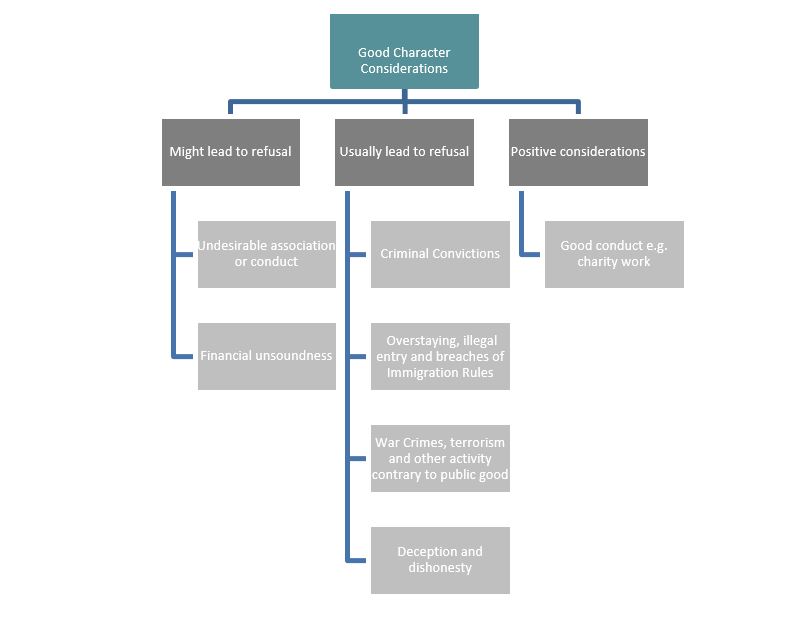Becoming a British Citizen: The Good Character Requirement

Every person who applies to become British Citizen must meet the mandatory ‘good character’ requirement.
What is the ‘good character’ requirement?
‘Good’ character is a mandatory requirement that the applicant must satisfy to naturalise as a British Citizen. If the applicant is though to be of ‘bad’ character, the Home Office will refuse the application.
Good character is not defined in law. However, Home Office guidance does provide details of what will likely be considered ‘bad’ character.
What is considered to be ‘bad character’?
The current Home Office guidance offers a non-exhaustive list of what they deem ‘bad character.’
The below diagram summarises what will be considered and how likely each consideration is to lead to a refusal. Each point is then discussed in turn.

Criminal convictions
An applicant’s previous criminal convictions can lead to a refusal.
The weight given to different types of prison sentence can be summarised as follows:
| Type of Sentence | Consequence for application |
| Imprisonment of 4 years or more | Application likely to be refused, regardless of how long ago the sentence was given |
| Imprisonment between 12 months and 4 years | Application likely to be refused unless the sentence ended more than 15 years ago |
| Imprisonment of up to 12 months | Application likely to be refused unless the sentence ended more than 10 years ago |
| Non-custodial sentence or other criminal record | Application likely to be refused unless the conviction is more than 3 years old |
It is important that the applicant discloses all convictions, no matter how trivial they themselves deem them.
War Crimes and terrorism
It is not public knowledge what exactly the Home Office will consider regarding this. The applicant should therefore err on the side of caution and assume that any involvement with such activity will lead to a refusal.
Financial unsoundness
The Home Office may look whether the applicant has experienced any of the following:
- Bankruptcy
- Being a director of a liquidated company
- Debt
- Non-payment of council tax
Where no fraud has been committed in bankruptcy and liquidation cases, there will be no automatic refusal. For other circumstances, the Home Office will look at the applicant’s culpability. Debt should only be a problem where the applicant has deliberately or recklessly accrued it.
Deception and dishonesty
Where the applicant attempts deception or dishonesty on their application for citizenship or is found to have done so in a previous application, this is very likely to mean refusal. The same is true if the applicant is found to have acted deceptively or dishonestly with government departments such as DWP and benefits.
Breaching the immigration rules
The following are some examples of breaches which will likely lead to refusal:
- Entering the UK illegally
- Evading immigration control or overstaying
- Cheating on a ‘Life in the UK’ or language test
The Home Office will look at any breaches of the immigration rules dating as far back as 10 years prior to the citizenship application.
Undesirable association or conduct
If the applicant is associated (for example through friendship) with anyone who has engaged in any of the above, this could lead to a refusal.
Positive considerations
The Home Office’s own guidance does not encourage decision makers to give weight to positive considerations such as charity work. However, case law states it is a relevant consideration so the applicant should include any relevant conduct in their supporting letter.
Contact
Our immigration specialists are able to advise on an application to become a British Citizen and on any good character issues that may affect the likely outcome.
If you have any queries relating to the good character requirements or obtaining British Citizenship in general, please contact our team on 0191 232 9547.



